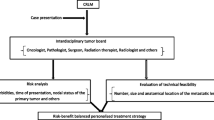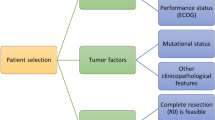Abstract
Colorectal cancer (CRC) incidence has increased during the past decades in Spain, being the first malignant tumour in incidence. Observed mortality for CRC is mainly due to liver and lung metastases. The only curative treatment is surgery; new surgical techniques and neoadjuvant treatments have increased the number of surgery candidate patients. Patients should be managed with a multidisciplinary approach that includes imaging techniques, chemotherapy, surgery and pathological assessment. As an answer to this approach, a group of pathology experts interested on CRC liver metastases aimed to review the diagnosis and prognosis of liver mestastases and developed practical recommendations for its assessment. The expert group revised the current literature and prepared questions to be discussed based on available evidence and on their clinical practise. As a result, recommendations for the assessment of tumour regression of liver metastases are proposed, which could be implemented in oncology centres allowing assessment standardisation for these patients. Prospective multi-center studies to evaluate these recommendations validity will further contribute to improve the standard care of CRC liver metastases patients.





Similar content being viewed by others
Notes
Surgical specimens must reach the laboratory untouched for macroscopic assessment and in order to prepare the sections with a comprehensive view of the sample.
If CPR is found after following this protocol, additional macro, micro or immunohistochemical analyses are not necessary for confirmation of CPR, although the final decision should be made according to the pathologist criteria.
References
Jemal A, Siegel R, Xu J, Ward E. Cancer statistics, 2010. CA Cancer J Clin. 2010;60(5):277–300. http://onlinelibrary.wiley.com/doi/10.3322/caac.20073/pdf.
EuropaColon. Colorectal cancer statistics. http://www.europacolon.com/crcstatistics.php?Action=Crcstatistics. Accessed 9 August 2013.
Béjar L, Gili M, Díaz V, Ramírez G, López J, Cabanillas JL, et al. Incidence and mortality by colorectal cancer in Spain during 1951–2006 and its relationship with behavioural factors. Eur J Cancer Prev. 2009;18:436–44.
Sociedad Española de Oncología Médica. El cáncer en España 2012. Cifras de cáncer, estimaciones para el año. 2012. http://www.seom.org/en/prensa/el-cancer-en-espanyacom/103644-el-cancer-en-espana-2012?showall=1. Accessed 9 August 2013.
Redondo Capafons S, Planas Giner A, Garriga Biosca R, Pla Poblador R. Neoadjuvant chemotherapy used for colorectal liver and lung metastasis resections. Farm Hosp. 2011;35(5):255, e1–5.
Khatri VP, Chee KG, Petrelli NJ. Modern multimodality approach to hepatic colorectal metastases: solutions and controversies. Surg Oncol. 2007;16(1):71–83.
Gómez-Ramírez J, Martín-Pérez E, Amat CG, Sanz IG, Bermejo E, Rodríguez A, et al. Influence of pre-surgical chemotherapy on liver parenchyma and post-surgical outcome of patients subjected to hepatectomy due to colorectal carcinoma metastases. Cir Esp. 2010;88(6):404–12.
Leonard GD, Brenner B, Kemeny NE. Neoadjuvant chemotherapy before liver resection for patients with unresectable liver metastases from colorectal carcinoma. J Clin Oncol. 2005;23(9):2038–48.
Kemeny N. Presurgical chemotherapy in patients being considered for liver resection. Oncologist. 2007;12(7):825–39.
Adam R, Wicherts DA, de Haas RJ, Ciacio O, Lévi F, Paule B, et al. Patients with initially unresectable colorectal liver metastases: is there a possibility of cure? J Clin Oncol. 2009;27:1829–35.
Kopetz S, Chang GJ, Overman MJ, Eng C, Sargent DJ, Larson DW, et al. Improved survival in metastatic colorectal cancer is associated with adoption of hepatic resection and improved chemotherapy. J Clin Oncol. 2009;27(22):3677–83.
Pawlik TM, Schulick RD, Choti MA. Expanding criteria for resectability of colorectal liver metastases. Oncologist. 2008;13(1):51–64.
Poston GJ, Adam R, Alberts S, Curley S, Figueras J, Haller D, et al. OncoSurge: a strategy for improving resectability with curative intent in metastatic colorectal cancer. J Clin Oncol. 2005;23:7125–34.
Díez-Fernández R, Salinas Hernández P, Girón-Duch C. Revisión del tratamiento quimioterápico del cáncer de colon metastásico. Farm Hosp. 2006;30:359–69.
Rubbia-Brandt L, Audard V, Sartoretti P, Roth AD, Brezault C, Le Charpentier M, et al. Severe hepatic sinusoidal obstruction associated with oxaliplatin-based chemotherapy in patients with metastatic colorectal cancer. Ann Oncol. 2004;15(3):460–6.
Vauthey JN, Pawlik TM, Ribero D, Wu TT, Zorzi D, Hoff PM, et al. Chemotherapy regimen predicts steatohepatitis and an increase in 90-day mortality after surgery for hepatic colorectal metastases. J Clin Oncol. 2006;24:2065–72.
Ribero D, Wang H, Donadon M, Zorzi D, Thomas MB, Eng C, et al. Bevacizumab improves pathologic response and protects against hepatic injury in patients treated with oxaliplatin-based chemotherapy for colorectal liver metastases. Cancer. 2007;110(12):2761–7.
Klinger M, Eipeldauer S, Hacker S, Herberger B, Tamandl D, Dorfmeister M, et al. Bevacizumab protects against sinusoidal obstruction syndrome and does not increase response rate in neoadjuvant XELOX/FOLFOX therapy of colorectal cancer liver metastases. Eur J Surg Oncol. 2009;35(5):515–20.
Klinger M, Tamandl D, Eipeldauer S, Hacker S, Herberger B, Kaczirek K, et al. Bevacizumab improves pathological response of colorectal cancer liver metastases treated with XELOX/FOLFOX. Ann Surg Oncol. 2010;17(8):2059–65.
Pawlik TM, Abdalla EK, Ellis LM, Vauthey JN, Curley SA. Debunking dogma: surgery for four or more colorectal liver metastases is justified. J Gastrointest Surg. 2006;10:240–8.
Pawlik TM, Scoggins CR, Zorzi D, Abdalla EK, Andres A, Eng C, et al. Effect of surgical margin status on survival and site of recurrence after hepatic resection for colorectal metastases. Ann Surg. 2005;241(5):715–22.
de Haas RJ, Wicherts DA, Flores E, Azoulay D, Castaing D, Adam R. R1 resection by necessity for colorectal liver metastases: is it still a contraindication to surgery? Ann Surg. 2008;248(4):626–37.
Poston GJ, Adam R, Alberts S, Curley S, Figueras J, Haller D, et al. OncoSurge: a strategy for improving resectability with curative intent in metastatic colorectal cancer. J Clin Oncol. 2005;23:7125–34.
Moertel CG, Hanley JA. The effect of measuring error on the results of therapeutic trials in advanced cancer. Cancer. 1976;38:388–94.
WHO handbook for reporting results of cancer treatment who offset publication no. 48. ISBN 92 4 170043 3. Geneva: World Health Organization; 1979. http://whqlibdoc.who.int/offset/WHO_OFFSET_48.pdf.
Miller AB, Hoogstraten B, Staquet M, Winkler A. Reporting results of cancer treatment. Cancer. 1981;47:207–14.
Young H, Baum R, Cremerius U, Herholz K, Hoekstra O, Lammertsma AA, et al. Measurement of clinical and subclinical tumour response using [18F]-fluorodeoxyglucose and positron emission tomography: review and 1999 EORTC recommendations. European Organization for Research and Treatment of Cancer (EORTC) PET Study Group. Eur J Cancer. 1999;35(13):1773–82.
Therasse P, Arbuck SG, Eisenhauer EA, Wanders J, Kaplan RS, Rubinstein L, et al. New guidelines to evaluate the response to treatment in solid tumors. J Natl Cancer Inst. 2000;92:205–16.
Eisenhauer EA, Therasse P, Bogaerts J, Schwartz LH, Sargent D, Ford R, et al. New response evaluation criteria in solid tumours: revised RECIST guideline (version 1.1). Eur J Cancer. 2009;45(2):228–47.
Fernández A, Duch J, Flotats A, Camacho V, Estorch M, Carrió I. CT–PET and evaluation of therapy response. Is the size really important? Rev Esp Med Nucl. 2010;29(4):184–8.
Chun YS, Vauthey JN, Boonsirikamchai P, Maru DM, Kopetz S, Palavecino M, et al. Association of computed tomography morphologic criteria with pathologic response and survival in patients treated with bevacizumab for colorectal liver metastases. JAMA. 2009;302(21):2338–44.
Blazer DG 3rd, Kishi Y, Maru DM, Kopetz S, Chun YS, Overman MJ, et al. Pathologic response to preoperative chemotherapy: a new outcome end point after resection of hepatic colorectal metastases. J Clin Oncol. 2008;26(33):5344–51.
Gruenberger T, Arnold D, Rubbia-Brandt L. Pathologic response to bevacizumab-containing chemotherapy in patients with colorectal liver metastases and its correlation with survival. Surg Oncol. 2012;21(4):309–15.
Rubbia-Brandt L, Giostra E, Brezault C, Roth AD, Andres A, Audard V, et al. Importance of histological tumor response assessment in predicting the outcome in patients with colorectal liver metastases treated with neo-adjuvant chemotherapy followed by liver surgery. Ann Oncol. 2007;18(2):299–304.
Mandard AM, Dalibard F, Mandard JC, Marnay J, Henry-Amar M, Petiot JF, et al. Pathologic assessment of tumor regression after preoperative chemoradiotherapy of esophageal carcinoma. Clinicopathologic correlations. Cancer. 1994;73(11):2680–6.
Chan G, Hassanain M, Chaudhury P, Vrochides D, Neville A, Cesari M, et al. Pathological response grade of colorectal liver metastases treated with neoadjuvant chemotherapy. HPB (Oxford). 2010;12(4):277–84.
Maru DM, Kopetz S, Boonsirikamchai P, Agarwal A, Chun YS, Wang H, et al. Tumor thickness at the tumor-normal interface: a novel pathologic indicator of chemotherapy response in hepatic colorectal metastases. Am J Surg Pathol. 2010;34(9):1287–94.
Abengózar M, Fernández-Aceñero MJ, Chaves S, Celdrán A. Prognostic utility of tumor thickness at the tumor-normal interface in chemotherapy-treated hepatic colorectal metastasis. Pathol Res Pract. 2012;208(4):235–9.
Kishi Y, Zorzi D, Contreras CM, Maru DM, Kopetz S, Ribero D, et al. Extended preoperative chemotherapy does not improve pathologic response and increases postoperative liver insufficiency after hepatic resection for colorectal liver metastases. Ann Surg Oncol. 2010;17(11):2870–6.
Cleary JM, Tanabe KT, Lauwers GY, Zhu AX. Hepatic toxicities associated with the use of preoperative systemic therapy in patients with metastatic colorectal adenocarcinoma to the liver. Oncologist. 2009;14(11):1095–105.
Zalinski S, Bigourdan JM, Vauthey JN. Does bevacizumab have a protective effect on hepatotoxicity induced by chemotherapy? (Article in French). J Chir (Paris). 2010;147(Suppl 1):S18–24.
Rubbia-Brandt L, Lauwers GY, Wang H, Majno PE, Tanabe K, Zhu AX, et al. Sinusoidal obstruction syndrome and nodular regenerative hyperplasia are frequent oxaliplatin-associated liver lesions and partially prevented by bevacizumab in patients with hepatic colorectal metastasis. Histopathology. 2010;56(4):430–9.
Poultsides GA, Bao F, Servais EL, Hernandez-Boussard T, Dematteo RP, Allen PJ, et al. Pathologic response to preoperative chemotherapy in colorectal liver metastases: fibrosis, not necrosis, predicts outcome. Ann Surg Oncol 2012;19(9):2797–804 (Epub 2012 Apr 3).
Chang HH, Leeper WR, Chan G, Quan D, Driman DK. Infarct-like necrosis: a distinct form of necrosis seen in colorectal carcinoma liver metastases treated with perioperative chemotherapy. Am J Surg Pathol. 2012;36(4):570–6.
Brunt EM, Janney CG, Di Bisceglie AM, Neuschwander-Tetri BA, Bacon BR. Nonalcoholic steatohepatitis: a proposal for grading and staging the histological lesions. Am J Gastroenterol. 1999;94(9):2467–74.
Acknowledgments
The authors would like to thank Eliana Mesa who has provided medical writing assistance on behalf of Springer Healthcare. The necessary scientific meetings along with medical writing services were supported financially by Roche Farma, S.A. of Spain. Roche Farma, S.A. of Spain has not had any influence on the manuscript content.
Conflict of interest
María Rosa Ortiz Duran and Esther Díaz Gómez have received clinical study grants from Roche Farma S.A. of Spain, Ricardo González-Cámpora has participated on studies supported by Novartis. All other authors declare that they do not have any conflict of interest that may inappropriately influence this work.
Author information
Authors and Affiliations
Corresponding author
Additional information
This manuscript has been endorsed by the Sociedad Española de Anatomía Patológica.
Rights and permissions
About this article
Cite this article
Gómez Dorronsoro, M.L., Vera, R., Ortega, L. et al. Recommendations of a group of experts for the pathological assessment of tumour regression of liver metastases of colorectal cancer and damage of non-tumour liver tissue after neoadjuvant therapy. Clin Transl Oncol 16, 234–242 (2014). https://doi.org/10.1007/s12094-013-1104-3
Received:
Accepted:
Published:
Issue Date:
DOI: https://doi.org/10.1007/s12094-013-1104-3




